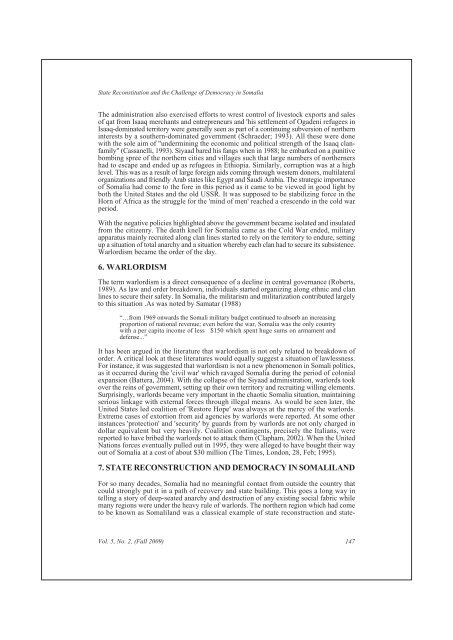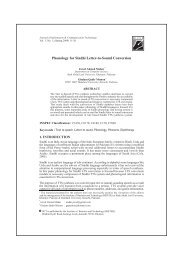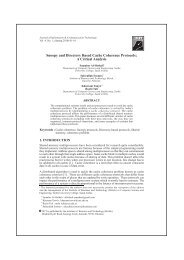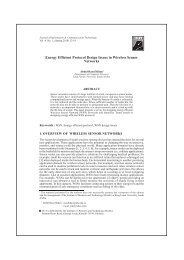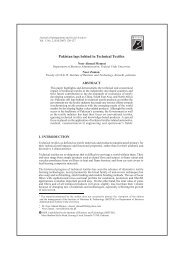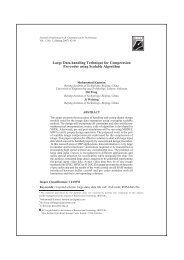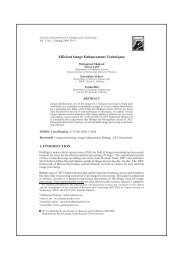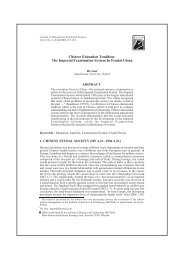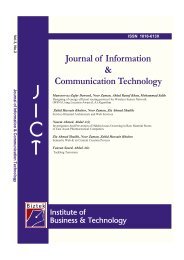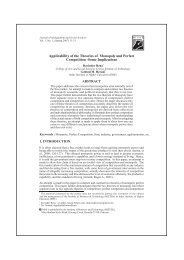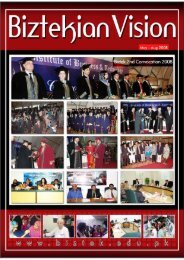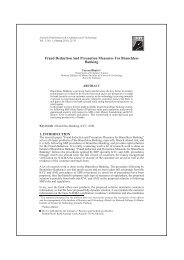State Reconstitution and the Challenge of Democracy in Somalia
State Reconstitution and the Challenge of Democracy in Somalia
State Reconstitution and the Challenge of Democracy in Somalia
You also want an ePaper? Increase the reach of your titles
YUMPU automatically turns print PDFs into web optimized ePapers that Google loves.
<strong>State</strong> <strong>Reconstitution</strong> <strong>and</strong> <strong>the</strong> <strong>Challenge</strong> <strong>of</strong> <strong>Democracy</strong> <strong>in</strong> <strong>Somalia</strong><br />
The adm<strong>in</strong>istration also exercised efforts to wrest control <strong>of</strong> livestock exports <strong>and</strong> sales<br />
<strong>of</strong> qat from Isaaq merchants <strong>and</strong> entrepreneurs <strong>and</strong> 'his settlement <strong>of</strong> Ogadeni refugees <strong>in</strong><br />
Isaaq-dom<strong>in</strong>ated territory were generally seen as part <strong>of</strong> a cont<strong>in</strong>u<strong>in</strong>g subversion <strong>of</strong> nor<strong>the</strong>rn<br />
<strong>in</strong>terests by a sou<strong>the</strong>rn-dom<strong>in</strong>ated government (Schraeder; 1993). All <strong>the</strong>se were done<br />
with <strong>the</strong> sole aim <strong>of</strong> "underm<strong>in</strong><strong>in</strong>g <strong>the</strong> economic <strong>and</strong> political strength <strong>of</strong> <strong>the</strong> Isaaq clanfamily"<br />
(Cassanelli, 1993). Siyaad bared his fangs when <strong>in</strong> 1988; he embarked on a punitive<br />
bomb<strong>in</strong>g spree <strong>of</strong> <strong>the</strong> nor<strong>the</strong>rn cities <strong>and</strong> villages such that large numbers <strong>of</strong> nor<strong>the</strong>rners<br />
had to escape <strong>and</strong> ended up as refugees <strong>in</strong> Ethiopia. Similarly, corruption was at a high<br />
level. This was as a result <strong>of</strong> large foreign aids com<strong>in</strong>g through western donors, multilateral<br />
organizations <strong>and</strong> friendly Arab states like Egypt <strong>and</strong> Saudi Arabia. The strategic importance<br />
<strong>of</strong> <strong>Somalia</strong> had come to <strong>the</strong> fore <strong>in</strong> this period as it came to be viewed <strong>in</strong> good light by<br />
both <strong>the</strong> United <strong>State</strong>s <strong>and</strong> <strong>the</strong> old USSR. It was supposed to be stabiliz<strong>in</strong>g force <strong>in</strong> <strong>the</strong><br />
Horn <strong>of</strong> Africa as <strong>the</strong> struggle for <strong>the</strong> 'm<strong>in</strong>d <strong>of</strong> men' reached a crescendo <strong>in</strong> <strong>the</strong> cold war<br />
period.<br />
With <strong>the</strong> negative policies highlighted above <strong>the</strong> government became isolated <strong>and</strong> <strong>in</strong>sulated<br />
from <strong>the</strong> citizenry. The death knell for <strong>Somalia</strong> came as <strong>the</strong> Cold War ended, military<br />
apparatus ma<strong>in</strong>ly recruited along clan l<strong>in</strong>es started to rely on <strong>the</strong> territory to endure, sett<strong>in</strong>g<br />
up a situation <strong>of</strong> total anarchy <strong>and</strong> a situation whereby each clan had to secure its subsistence.<br />
Warlordism became <strong>the</strong> order <strong>of</strong> <strong>the</strong> day.<br />
6. WARLORDISM<br />
The term warlordism is a direct consequence <strong>of</strong> a decl<strong>in</strong>e <strong>in</strong> central governance (Roberts,<br />
1989). As law <strong>and</strong> order breakdown, <strong>in</strong>dividuals started organiz<strong>in</strong>g along ethnic <strong>and</strong> clan<br />
l<strong>in</strong>es to secure <strong>the</strong>ir safety. In <strong>Somalia</strong>, <strong>the</strong> militarism <strong>and</strong> militarization contributed largely<br />
to this situation .As was noted by Samatar (1988)<br />
“…from 1969 onwards <strong>the</strong> Somali military budget cont<strong>in</strong>ued to absorb an <strong>in</strong>creas<strong>in</strong>g<br />
proportion <strong>of</strong> national revenue; even before <strong>the</strong> war, <strong>Somalia</strong> was <strong>the</strong> only country<br />
with a per capita <strong>in</strong>come <strong>of</strong> less $150 which spent huge sums on armament <strong>and</strong><br />
defense...”<br />
It has been argued <strong>in</strong> <strong>the</strong> literature that warlordism is not only related to breakdown <strong>of</strong><br />
order. A critical look at <strong>the</strong>se literatures would equally suggest a situation <strong>of</strong> lawlessness.<br />
For <strong>in</strong>stance, it was suggested that warlordism is not a new phenomenon <strong>in</strong> Somali politics,<br />
as it occurred dur<strong>in</strong>g <strong>the</strong> 'civil war' which ravaged <strong>Somalia</strong> dur<strong>in</strong>g <strong>the</strong> period <strong>of</strong> colonial<br />
expansion (Battera, 2004). With <strong>the</strong> collapse <strong>of</strong> <strong>the</strong> Siyaad adm<strong>in</strong>istration, warlords took<br />
over <strong>the</strong> re<strong>in</strong>s <strong>of</strong> government, sett<strong>in</strong>g up <strong>the</strong>ir own territory <strong>and</strong> recruit<strong>in</strong>g will<strong>in</strong>g elements.<br />
Surpris<strong>in</strong>gly, warlords became very important <strong>in</strong> <strong>the</strong> chaotic <strong>Somalia</strong> situation, ma<strong>in</strong>ta<strong>in</strong><strong>in</strong>g<br />
serious l<strong>in</strong>kage with external forces through illegal means. As would be seen later, <strong>the</strong><br />
United <strong>State</strong>s led coalition <strong>of</strong> 'Restore Hope' was always at <strong>the</strong> mercy <strong>of</strong> <strong>the</strong> warlords.<br />
Extreme cases <strong>of</strong> extortion from aid agencies by warlords were reported. At some o<strong>the</strong>r<br />
<strong>in</strong>stances 'protection' <strong>and</strong> 'security' by guards from by warlords are not only charged <strong>in</strong><br />
dollar equivalent but very heavily. Coalition cont<strong>in</strong>gents, precisely <strong>the</strong> Italians, were<br />
reported to have bribed <strong>the</strong> warlords not to attack <strong>the</strong>m (Clapham, 2002). When <strong>the</strong> United<br />
Nations forces eventually pulled out <strong>in</strong> 1995, <strong>the</strong>y were alleged to have bought <strong>the</strong>ir way<br />
out <strong>of</strong> <strong>Somalia</strong> at a cost <strong>of</strong> about $30 million (The Times, London, 28, Feb; 1995).<br />
7. STATE RECONSTRUCTION AND DEMOCRACY IN SOMALILAND<br />
For so many decades, <strong>Somalia</strong> had no mean<strong>in</strong>gful contact from outside <strong>the</strong> country that<br />
could strongly put it <strong>in</strong> a path <strong>of</strong> recovery <strong>and</strong> state build<strong>in</strong>g. This goes a long way <strong>in</strong><br />
tell<strong>in</strong>g a story <strong>of</strong> deep-seated anarchy <strong>and</strong> destruction <strong>of</strong> any exist<strong>in</strong>g social fabric while<br />
many regions were under <strong>the</strong> heavy rule <strong>of</strong> warlords. The nor<strong>the</strong>rn region which had come<br />
to be known as Somalil<strong>and</strong> was a classical example <strong>of</strong> state reconstruction <strong>and</strong> state-<br />
Vol. 5, No. 2, (Fall 2009)<br />
147


